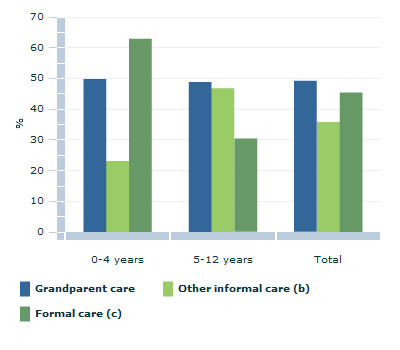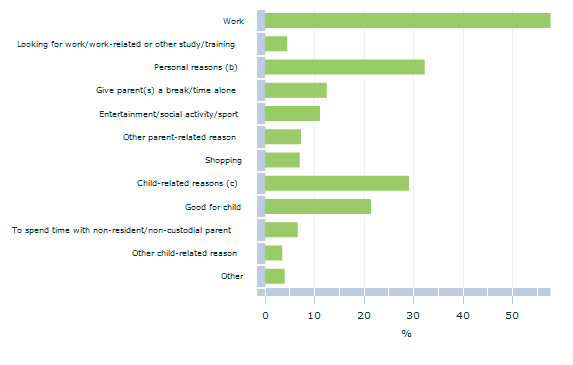Page tools:
 Print Page Print Page
 Print All Print All
| |||||
|
Grandparents provide child care for many Australian families. In 2011, 937,000 children received child care from a grandparent on a regular basis. This represented one-quarter (26%) of all children under the age of 12 or half (49%) of those children who regularly attended some type of child care. Data in this article are primarily sourced from the survey of Childhood Education and Care, Australia, 2011, and data and commentary refer to children in the care of a grandparent on a regular rather than irregular basis1.
As shown in the graph below, parents often use a combination of formal and informal care to meet their child care needs. Of young children (aged 0–4 years), 878,100 (60%) regularly attended some type of child care. One in two (50%) of this group were cared for by a grandparent and a similar proportion were in long day care (53%). There was a high degree of overlap between these two groups, about one-third of children who attended formal care also received regular care from a grandparent. Among older children (aged 5–12 years), 1,025,000 or a little under half (47%) regularly attended care. Of these children, almost half (49%) were looked after by a grandparent. In comparison about a quarter (27%) of these children attended before and after care. CHILDREN AGED 0–12 YEARS WHO REGULARLY ATTENDED CHILD CARE, TYPE OF CARE USED (a)  Footnote(s): (a) Components do not add to total as children could use more than one type of care. (b) Includes 'Non-resident parent', Brother/sister', 'Other relative' and 'Other person'. (c) Includes 'Before and/or after school care', 'Long day care', 'Family day care' and 'Occasional care'. Source(s): ABS Childhood Education and Care, Australia, 2011 (cat. no 4402.0) For children attending care, the proportion receiving child care from a grandparent was similar in both age groups at around one in two. In contrast, formal care decreased from 63% for young children to 30% for older children. Among children who were regularly cared for by a grandparent, young children, on average, received more care (10 hours a week) than older children (6 hours a week). In 2011, 541,000 or nearly three out of five children (58%) who were looked after by a grandparent received their child care so that their parent could go to work. Other reasons included parents having a break (13% of children aged 0–12 years), enjoying entertainment, social activity and sport (11%) or going shopping (7%). Child related reasons included that care by a grandparent was good for the child (21%) and to facilitate contact with a non-resident parent (7%). CHILDREN AGED 0–12 YEARS, ALL REASONS CHILD CARED FOR BY A GRANDPARENT (a)  Footnote(s): (a) Components do not add to 100% as respondant could select more than one reason. (b) Includes 'Give parent(s) a break/time alone', 'Entertainment/social activity/sport' and 'Other parent related reason' and 'Shopping'. (c) Includes 'Good for child', 'To spend time with non-resident/non-custodial parent' and 'Other child related reason'. Source(s): ABS Childhood Education and Care, Australia, 2011 (cat.no 4402.0) A time series analysis of child care provided by a grandparent is not available due to a change in collection methodology between 2008 and 20112. However, data from previous surveys, 1999–2008, showed that the provision of child care by a grandparent in the week prior to collection remained relatively stable at around one-in five (between 19% and 22% of children aged 0–11 years)3. For further information, see Childhood Education and Care, Australia, 2011 (cat. no. 4402.0). 1. Regular child care may take place during the day time, school holidays or on either side of prearranged commitments such as formal care, preschool or school. Irregular care may take place on an occasional basis such as during an emergency or when a child is unable to access formal care due to a personal illness. 2. See Explanatory Note No. 21 in the survey of Childhood Education and Care, Australia, 2011(cat no. 4402.0). 3. ABS Childhood Education and Care, Australia, Datacubes, June 2011 (cat. no. 4402.0.55.003) Document Selection These documents will be presented in a new window.
|
||||
4211.0 - Education and Training Newsletter, October 2012
ARCHIVED ISSUE Released at 11:30 AM (CANBERRA TIME) 26/10/2012
This page last updated 9 May 2013
